Narrelle M. Harris's Blog, page 38
March 21, 2013
Review: The Fine Point of His Soul by Julie Bozza (AWW Challenge 2013 #5)
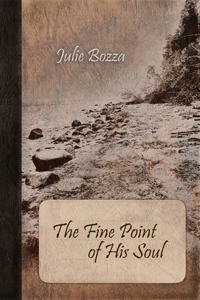 I don’t know a lot about 19th century poets but I know what I…
I don’t know a lot about 19th century poets but I know what I…
No. That’s it. I don’t know a lot about 19th century poets.
I do read some 19th century literature, though – mainly Arthur Conan Doyle and select Gothic horror novels, which I love for their arcane delicacy and creeping horror as much as for the rich language.
Julie Bozza’s novel, The Fine Point of His Soul, wonderfully combines Gothic horror and the poetic philosophy of the Romantics by having Keats, the Shelleys and Byron all as characters in her elegant, flowing and gloriously creepy alternative history set in Italy in 1820-21.
The story is narrated by sailor Andrew Sullivan, who is seeking a man named Adrian Hart, hoping to exact some kind of justice from him. Hart, going by the name of Iago, is an elusive figure, responsible for the death of his own sister, Elena, the wife of Sullivan’s captain, and secret beloved of Andrew himself.
Sullivan falls in with Keats and Keats’ friend, the artist Severin, and joins them on their journey to Rome, where they all become entangled is Hart’s murky doings. Before long, the Shelleys, Byron and Byron’s loyal servant Fletcher are enlisted in the mission to find out what Hart is up to and how they might thwart him – if they can indeed discover his true nature.
The true nature of Adrian Hart is very difficult to define. Quoting Iago, all he’ll say about himself is ‘I am not what I am’, and that appears to be of little help to anyone, though it gives pretty much everyone the creeps. As a protagonist, Hart is in fact seen very little in this book – but we see the effects of his passage everywhere we look. We encounter those who have encountered Hart and see for ourselves the wreckage they become, even while having no idea what he is doing to them or how.
Bozza treads some very fine lines in this novel, but does so as a skilled tightrope walker. She evokes the language and cadences of the time period without sounding like a pastiche – her prose has an easy, thoroughly readable flow. Through Andrew Sullivan she has a narrator who is practical but has a love of the noble and poetic, particularly explored through his friendship with Keats and the discussions he has with all the poets.
Bozza writes artists who converse like artists without getting pompous or sounding like she’s simply reworking material from their own poetry or diaries. Her understanding of the poets in question and their worldviews feels extensive, and she manages to incorporate these ideas with a light touch and a sensibility for how they impact the characters, their interactions and the overall story.
And she carries of the trick of the 19th century Gothic novel of having a slow pace that takes a long time to advance the hunt for Hart without being in the slightest bit dull or a drag. Instead, the inexorable pace of it is taut and full of anticipation. The events that ratchet up the tension are often small but significant: the inexplicable devastation visited on Severn when he meets Hart and has a drawing taken from him; the sway that Hart seems to have over the fascinated Byron; the confrontation that leaves our hero Sullivan in despair.
There is a definite creeping horror in The Fine Point of His Soul, the product of a finely wrought atmosphere rather than any scenes of violence or recognisable corruption. The final confrontation takes place in Hart’s notorious library (a scene which, as a book lover, pulled me exquisitely in several directions) and the poets and other protagonists are left to make what sense they can of the outcome, as well as the nature of the evil of Adrian Hart – this venomous Iago. There’s an element of frustration to this lack of definition, but also a certain pleasure in deciding for yourself. (I see him as a vampire of sorts, but of course we know my predelictions in this area.) I admit I found the ending perfect and in keeping with the tone and atmosphere built so carefully throughout the novel.
The Fine Point of His Soul is a beautifully crafted novel of Gothic horror, evoking original tales of the time period while achieving its own storytelling voice.
It also makes me want to go out and read the poetry of the Romantics.
Buy The Fine Point of His Soul
 from Amazon.com for Kindle or in paperback
from Amazon.com for Kindle or in paperbackGet The Fine Point of His Soul in paperback from Booktopia
Find out about other editions (and more of Julie Bozza’s work) at LibraTiger.
Narrelle M Harris is a Melbourne-based writer. Find out more about her books, smartphone apps, public speaking and other activities at www.narrellemharris.com.


March 10, 2013
Review: A Brighter Spark by Mary Borsellino (AWW Challenge 2013 #4)
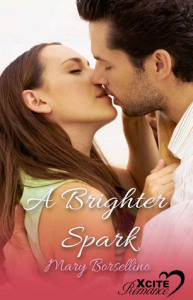 Readers of this blog will know how much I adore Mary Borsellino’s horror fiction. The Wolf House and The Devil’s Mixtape remain two of my very favourite works.
Readers of this blog will know how much I adore Mary Borsellino’s horror fiction. The Wolf House and The Devil’s Mixtape remain two of my very favourite works.
Have I mentioned how versatile that writer is, though? Have I? Because she is. Not only does she write amazing horror, she also writes fun and sexy erotica with wit and intelligence.
While her latest, A Brighter Spark, hasn’t the complexity of her longer genre work, the deceptively simple story addresses a very modern human issue: how do you know when you’re a proper, fully functioning adult? And why would you want that, instead of the freewheeling excitement of being young?
Suzy is a single mum of kids in their awkward teens, and feels like life is slipping away from her. She doesn’t feel like a proper grown up, but the mad joys of her youth are obviously well behind her. Feeling at a dead end, Suzy meets the gorgeous and possibly perfect Daniel, and a one night stand blooms into the potential for something more. But Suzy fears she can’t possibly live up to him, just as she fears that being a proper adult means leaving behind all the fun stuff forever.
Suzy is likeable and you can readily identify with her as she stumbles through the difficulties of learning what responsible adulthood really means. Daniel is indeed a picture of perfection, but with just enough charm and a little geekiness to make him very appealing. As always, Borsellino does a pitch-perfect job of creating the teenaged characters and their relationships with the respective parents.
A Brighter Spark is a light, fun read, populated with appealing characters, good humour and some distractingly passionate scenes.
Buy A Brighter Spark (Xcite Romance)
 for your Kindle.
for your Kindle.Narrelle M Harris is a Melbourne-based writer. Find out more about her books, smartphone apps, public speaking and other activities at www.narrellemharris.com.


March 7, 2013
Don’t Fence Me In (or, Narrelle’s adventures in new genres)
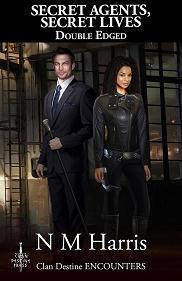 I sometimes sort-of-joke in job interviews that I haven’t had a career path. I’ve had a career meander. I’ve pottered about, taking jobs on the basis of my skills and interests at the time. Sometimes my interests were basically ‘I need to pay the rent’. I have been a bank teller, a customer service person, a kitchen hand and, for one awful and soul-withering afternoon, an outbound telemarketer.
I sometimes sort-of-joke in job interviews that I haven’t had a career path. I’ve had a career meander. I’ve pottered about, taking jobs on the basis of my skills and interests at the time. Sometimes my interests were basically ‘I need to pay the rent’. I have been a bank teller, a customer service person, a kitchen hand and, for one awful and soul-withering afternoon, an outbound telemarketer.
But then I found the courage to break out of all those jobs that I did not love to write for a living, at least in the corporate sphere. I took my rather patchy background and wove a narrative through it of me as a writer: of letters to clients, of training materials, of articles for social clubs. Thank goodness for those three years I spent teaching English as a Foreign Language in Egypt in Poland, which got me through the door.
But even my corporate writing career has been eclectic. I’ve written abstracts for a news-gathering service; educational materials and advocacy texts for an aid agency; brochures, newsletters, taglines and marketing texts for an advertising company. For a year I was a journalist who wrote about supermarkets and convenience stores and related products (and I’m still unreasonably excited that I got to interview Stephen Twining of Twinings Tea). These days I’m a quality assurance editor, being paid to be pernickety about other people’s grammar.
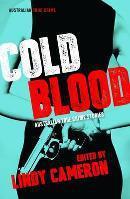 Frankly, if I’m all over the place when it comes to my day-job career, it can hardly be a surprise to anyone that I’m just as eclectic in my vocational writing. So far in my non-office writing career I have produced crime, fantasy and horror fiction. I’ve written a true crime essay (part of the recently re-released Cold Blood) and two non-fiction smartphone apps. I’ve written a play. I’m currently writing songs with my talented niece, Jess Harris, for a new book project.
Frankly, if I’m all over the place when it comes to my day-job career, it can hardly be a surprise to anyone that I’m just as eclectic in my vocational writing. So far in my non-office writing career I have produced crime, fantasy and horror fiction. I’ve written a true crime essay (part of the recently re-released Cold Blood) and two non-fiction smartphone apps. I’ve written a play. I’m currently writing songs with my talented niece, Jess Harris, for a new book project.
And my latest unexpected foray into new genres?
I’ve become a writer of erotic fiction!
I haven’t always been a fan of the genre. I read a lot of romance novels that made me want to stab one or both protagonists, but I don’t believe in dissing a genre I haven’t actually read. As much as most of the books I read left me cold, though, I would sometimes find books that were fun, with great characters and rollicking plots. I also kept meeting smart, funny, confident women who enjoyed the field. I must be missing something, I thought. So I asked the Twittersphere for advice and it delivered Anne Gracie to me. Oh. So that’s what all the fuss was about. That was what a good, fun, saucy romance story could be!
When Lindy Cameron, my publisher at Clan Destine Press, approached me about writing for the press’s new Encounters line, I thought: why not? I haven’t written in that genre before, but it’s an element of some of my previous books. And it’ll be a challenge. It’s good to be challenged. It’s obviously very hard to write romance and erotica well, and I want to find out if I can do it. I want to find out if I can write a believable romance as the central point of a story, and if I can write an explicit sex scene that isn’t utterly risible.
Let’s face it, most of my books contain an intense relationship of some kind – often a romantic one, though not always. Exploring human relationships is a significant part of my plots.
Thus – ta da! – I have added a new genre to my literary ensemble. Double Edged is the first short story in the Secret Agents, Secret Lives series. Other stories are being prepared for that and another series in Clan Destine’s Encounters erotica stories, written mainly by writers better known from other genres – including Kerry Greenwood, of Phryne Fisher fame.
To delineate this genre from my other work, I’ve opted to publish the stories under a simplified variant of my own name – NM Harris – rather than my stripper name (Heidi Hillside, if you’re interested). After all, I don’t have children to protect from my own reputation, and I’m actually pretty proud of my efforts in the genre.
But you know me – I love a bit of adventure! Double Edged is full of action, sacrifice, explosions, spy shenanigans, swordplay and sass. And that’s before we even get to the saucy scenes.
I’d love it if you’d come on this surprise foray into love and adventure with me. (And I hope you like it if you do. It’s only $1.80, so it’s worth a try!)
And let’s all wait with bated breath to see what genre I’ll be writing in next!
Double Edged by NM Harris
Martine Dubois is a disgraced cop whose main sin was to trust a partner she should not have trusted.
When spymaster Philip Marsden, who has a painful past of his own, recruits Martine as an agent, it’s her chance to find redemption, and a chance for both of them to find love – unless duty kills them first.
Get Double Edged (Clan Destine Encounters)
 from Amazon.com
from Amazon.comGet Double Edged from Kobo
Get Doubled Edged from Clan Destine Press (ePub and Mobi)
Get Clan Destine’s other books from the Encounters line!
Narrelle M Harris is a Melbourne-based writer. Find out more about her books, smartphone apps, public speaking and other activities at www.narrellemharris.com.


March 3, 2013
Review: The Shattered City by Tansy Rayner Roberts (AWW Challenge 2013 #3)
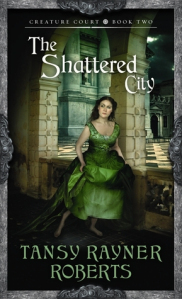 Last year, I read and absolutely adored the first of Tansy Rayner Roberts’ Creature Court series, Power and Majesty.
Last year, I read and absolutely adored the first of Tansy Rayner Roberts’ Creature Court series, Power and Majesty.
At last I’ve had the time to read the second in the trilogy, The Shattered City, and once more I have been blown away by the brilliance of the storytelling. Character, plot, pace, theme: everything is pitch perfect.
The Shattered City manages to recreate everything that is so compelling about Power and Majesty and then bloom like fireworks from that starting point. And yes, I am aware of the hyperbole, but seriously? SERIOUSLY? Hyperbole is necessary.
In this second part of the Creature Court series, the dressmaker Velody has come belatedly into her powers and managed to make a place for herself in the court – she is their Power and Majesty, presuming she can keep this not entirely trustworthy band together, defeat the sky in its nightly battle to devour the city of Aufleur, and not get herself or her friends killed in the process.
That may be much harder than the already very difficult task seems. The sky seems to be growing in destructive capacity and intent, and something is loose in Aufleur, attacking the Court and sewing distrust. Well, more distrust. What it is, where it’s from and what it portends are all very worrying indeed.
Velody looks like she might be holding it all together; she might be changing the Court to a better alliance after all – if she survives. That is a very long way from guaranteed.
In the meantime, Velody’s friend Delphine pauses in her merry dance of self-destruction to deny deny deny that she has any role with the Court or its sentinels, and Rhian, who survived such a terrible ordeal, has to learn how to deal with people again. There are roles laid out for everyone, path they should be treading – if only the wretches would do as they’re told. But they don’t. They won’t play fate’s games, let alone the court’s, and the resulting conflicts and clashes send the story hurtling with cracking pace, humour, drama and some really deadly frocks.
Power and Majesty flew along at a brilliant pace, yet provided time for character and back story to grow. It was never predictable and always surprised me without once doing anything that didn’t fit the story or the people in it. It was a lot for a sequel to live up to. That The Shattered City surpasses it is a hell of a feat.
A lot of the time as I read a book, events unfold and I start to see the shape of how the story will be told. Without knowing exactly how something will come to pass, I can start to see the shade and shape of an ending. As the book progresses, doors close on possibilities and you feel yourself guided towards a particular outcome. Of course, surprises can still occur, but generally there’s a feeling of knowing what the path ahead is paved with, at least, if not the final destination.
The Shattered City laughs in the face of such notions, in the best way. While you can see some dangers before the characters do (in the best tradition of Hitchcockian suspense), the full consequences are always just beyond sight. Events occur, some possibilities close off, but instead of narrowing down the future, each new event seems to blast off a cavalcade of new futures.
It’s like being a Seer, the way that Hel has visions of all the futures, and each change in the present only sets off a new cascade of possibility.
It’s an incredible bit of writing and plotting, to pull that off – to put the reader in the place of the seer, with all kinds of futures unfolding before you, and all you can do is read on, pulled through events with the frantic desire to find out oh dear god what now? what next? and wonder how it’s all going to end, and who is going to survive any ending we can currently see.
So. Yes. I wax lyrical. I leap about and paint this blog with colourful prose and hyperbole and wave my hands at you in a frantic, inarticulate way while saying: read it read it oh for the love of god, any god, for the love of chocolate, if you have to, but read these books!!!
Because Power and Majesty and The Shattered City are unexpected and textured and deep and wonderful and funny and horrific and created by a writer with such depth, intelligence, wit and mastery of language, plot, theme and character that I can only sit here and wish I was half as good.
I need a little lie down for a while, but after that – Reign of Beasts, here I come!
Power and Majesty:
Buy Power and Majesty in paperback
Get Power and Majesty
 for your Kindle
for your KindleThe Shattered City:
Buy The Shattered City in paperback
Get The Shattered City (Creature Court)
 for your Kindle.
for your Kindle.Narrelle M Harris is a Melbourne-based writer. Find out more about her books, smartphone apps, public speaking and other activities at www.narrellemharris.com.


February 28, 2013
It Means What It Is

From ‘Van Gogh, les parodies et les geeks’ at La boite verte.
I’ll always be grateful for Matthew Collings’ 1999 TV series This is Modern Art. It taught me a lot about modern art, for a start, but more importantly it taught me that enjoying a piece of art is very subjective: and so is loathing one, or having no reaction to it at all.
I mean, either I respond to a piece or I don’t; and if I respond, it may be positive or negative – but in the end, I just feel how I feel. Maybe I can articulate the reasons for my reaction, maybe I can’t, but how I feel is no indicator of whether a piece is ‘good’ or ‘bad’. All I can say is how I respond to something, and then try to understand why I respond that way.
Once I let go of any idea of what kind of art I was supposed to think good or bad, I could just get on with either liking it or not as I saw fit.
And apparently, what I see fit to like (or not) in art revolves around humour and an appreciation of layers of meaning.
This appreciation of my own art appreciation came home to me as I visited MONA in Hobart on 21 February.
I first visited MONA in 2011. I love that gallery. I love the way it uses technology to make viewing art easy and more interesting. I love how texts on its O device help to break down those barriers of how art ‘should be’ received and instead opens visitors up the the excellent notion that all responses are valid.
This visit, my layers of appreciation revolved around:
thinking about artworks I was seeing for the first time.
enjoying rediscovering pieces I’d seen an loved in other exhibitions and didn’t know I’d find, like Zizi the Affectionate Couch and Korean video artist Junebum Park’s 3 Crossing.
rediscovering pieces that I enjoyed the first time around at MONA, like the two live goldfish swimming in a deep plate of water around a chopping knife, and the Pulse Room.
amusing myself with the way certain pieces and moments made me think of other things in pop culture.
That’s one of the fun things about seeing lots of art as well as seeing lots of pop culture that may mention art. Everything you see accumulates layers of meaning.
One evocative piece had two speakers in a darkened room, each emitting the voice of the artist singing two versions of a folk song.
The song is the story about two sisters in love with the same man. One sister pushes the other into the river so she can have the man to herself. The drowned sister dies, is washed ashore, and her bones and hair are made into a fiddle that will only play a lament.
One speaker is the song of the sister who pushed; the other is the song of the sister who drowned.
It’s a wonderful piece of sound sculpture, with two simple speakers standing in for those tragic sisters. It also is the latest layer in my relationship with that story, which I’ve heard in different folk songs and in different forms. One of my favourite versions is Loreena McKennitt’s The Bonny Swans, which adds another sister and incorporates at least two versions of the story in a single song.
Not all of my pop culture associations were so elegant. At various times I was reminded of Rimmer admiring Legion’s light switch [at 1:50], or John Cleese and Eleanor Bron admiring the TARDIS in Doctor Who’s City of Death, or Ben Miller’s crusty old historian saying ‘It is, of course, absolutely priceless’ just before he manages to destroy whatever fabulous historical artefact he’s looking at in the Miller and Armstrong sketch show.
So it may be that no-one else but Tim knew what I was giggling about at some of those exhibits, but it’s liberating to know that it doesn’t really matter what anyone else thought about either the art or my giggling.
I love the layers of perception I experience, without regard for ‘high’ or ‘low’ art. Art is just art. Creativity is just creativity. And whether I like it and the ways in which I do (or not), matter only to me. It’s enough to have an opportunity to see other people’s imaginations splashed out for the world to see, and to feel however I feel about it, and try to work out why I react the way I do.
That way, I don’t just learn about art. I learn about myself.
Narrelle M Harris is a Melbourne-based writer. Find out more about her books, smartphone apps, public speaking and other activities at www.narrellemharris.com.


February 19, 2013
In No Way a Little Bush Maid
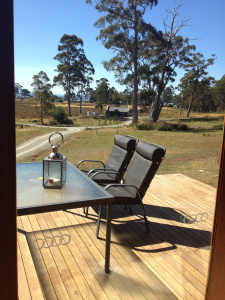 As I write, I am sitting at a rustically hewn wooden table in a kitchen overlooking a paddock. Across the way, I can see the waters of Adventure Bay, on the eastern side of the south half of Bruny Island. This morning, there were wallabies on the lawn in front of the patio, including one of the island’s 200-odd white wallabies. Birds were calling, including one that sounded like a squeaky bed being put to energetic use.
As I write, I am sitting at a rustically hewn wooden table in a kitchen overlooking a paddock. Across the way, I can see the waters of Adventure Bay, on the eastern side of the south half of Bruny Island. This morning, there were wallabies on the lawn in front of the patio, including one of the island’s 200-odd white wallabies. Birds were calling, including one that sounded like a squeaky bed being put to energetic use.
Yesterday, I was on a cruise around Bruny Island, heading far enough south to cross into the Southern Ocean (a new ocean for me!) to see seals, albatrosses, mutton birds, jellyfish and several kinds of gull. The little boat sped through the Monument formation at speed, throwing spray into the air and banking steeply past the rocks. (Do they call it ‘banking’ in boats?) It was a hoot.
 Tasmania is tinder-dry at the moment, but even with the yellow grass and thirsty-looking plants, and signs of bushfires from both last year and the fire that devastated the island in 1967, there’s something magnificent about the Australian bush. A kind of austerity and hardiness about it. The skeletons of dead gum trees poke above the canopy of the regrowth like a signpost to tenacity. I know it’s a bit of a cliché, but I can’t help but think of Dorothea Mackellar’s poem, My Country. I do love a sunburnt country. This wide brown land is definitely for me.
Tasmania is tinder-dry at the moment, but even with the yellow grass and thirsty-looking plants, and signs of bushfires from both last year and the fire that devastated the island in 1967, there’s something magnificent about the Australian bush. A kind of austerity and hardiness about it. The skeletons of dead gum trees poke above the canopy of the regrowth like a signpost to tenacity. I know it’s a bit of a cliché, but I can’t help but think of Dorothea Mackellar’s poem, My Country. I do love a sunburnt country. This wide brown land is definitely for me.
When I was a young girl (some time in the 17th century, it sometimes feels like) I used to read the Billabong books by Mary Grant Bruce (including The Little Bush Maid, of course). I also read a lot of Australian horse books, including the Silver Brumby series and books by Mary Elwyn Patchett). I loved Dot and the Kangaroo. I ate up Snugglepot and Cuddlepie with a spoon. ON TV I watched Skippy and Cash and Co and Luke’s Kingdom. In short, I devoured any and all stories set in the Australian bush.
Of course, I didn’t actually grow up in the bush. I grew up on air force bases and in suburbia. As an adult, my homes crept closer and closer to city centres until now I live diagonally opposite Melbourne’s former GPO – as close to the centre of the city and the 0 mile marker as I can get without actually living in the post office.
You see, here’s the thing. I appreciate that nature exists. I am glad that it’s out there, and that there are people who love living in it and are competent in that environment.
I am not one of those people.
As much as I like the idea of nature, I generally don’t much enjoy being right in the middle of the fact of nature. It’s itchy and hot and uncomfortable, or wet and miserable and uncomfortable. The paths, when there are paths, are uneven, and I have twisted my ankle or slipped onto my arse more than once. Scuttling things live in nature. Being Australia, they can be scuttling venomous things.
And please note, I do not have an irrational fear or phobia of spiders. I have twice been hospitalised with venomous spider bite, on both occasions in suburban homes. If that’s what they can do to me when surrounded by concrete and breeze blocks, what could they manage in their natural environment if they spat on their way-too-many hands and really got down to business? My fear of those little bastards is perfectly rational and based on painful personal experience.
Perhaps I’m just a living example of that whole dichotomy of the European relationship with this land, drawn to and terrified of it in equal measure.
The gorgeous lodge where I’m staying, at the Adventure Bay Retreat, is giving me a wonderfully safe way to prod at the fringes of the Australian landscape. I’ve watched the sun climb into the sky, listened to the kookaburras and that squeaky-mattress bird from the comfort of this beautiful wooden kitchen, sipping on an espresso coffee and eating toast and marmalade.
Last night, after the aircon cooled the house down from the very hot day, Tim and I sat on the patio with a glass of wine and watched a white wallaby and its brown herd-mates bounce down to the road. I read on my Kindle for a while and just before we climbed into a king-sized bed with fluffy soft pillows we went out to look at the stars and the wisps of white that give the Milky Way its name – something we never see from our city abode.
So yes, I’m a soft city girl. I need a buffer between me and Nature. I like a view of the sunburnt country that does not require that I, too, must be sunburnt, or bitten by mosquitoes (or spiders) (or snakes). I love the other parts of this beautiful planet, too: the deserts and forests I’ve seen, the farmlands and the mountains, the tamed suburbs and the untamed wilds.
But I always come home. Whatever the world has to offer, it’s still her beauty and her terror, her pitiless blue sky, this wilful lavish land for me.
Well, as long as a decent café latte isn’t too far away.
Disclaimer: My cruise was courtesy of Bruny Cruises and my accommodation was courtesy Adventure Bay Retreat.
Narrelle M Harris is a Melbourne-based writer. Find out more about her books, smartphone apps, public speaking and other activities at www.narrellemharris.com.


February 14, 2013
The Grammar of Song
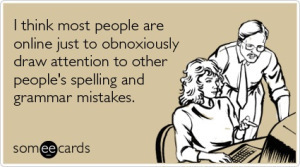 For Melburnians who love cabaret, the dear old Butterfly Club may have been turfed out of its old home in South Melbourne, but it now has new digs in the city. The shiny new Carson Place venue is tucked down an alleyway, as all the best Melbourne venues and bars are.
For Melburnians who love cabaret, the dear old Butterfly Club may have been turfed out of its old home in South Melbourne, but it now has new digs in the city. The shiny new Carson Place venue is tucked down an alleyway, as all the best Melbourne venues and bars are.
I was one of many, many people who helped to fund the Butterfly Club’s move through a Pozible crowd-funding exercise, I’m proud to say. To celebrate the successful fundraising and the imminent launch of the new venue, the Club held a gala evening at the Melbourne Town Hall on 8 February.
One of my favourite acts (and there were many splendid acts at the Gala) was Gillian Cosgriff, who sang a song made of up texts from an ex-beau who didn’t know why she’d dumped him. (Hint: The texts had somethink to do with how fustrated he was that for all intensive purposes he didn’t know definately what had gone wrong.)
I howled with laughter from start to finish, evil grammar nazi that I am. I wouldn’t have lasted a single date before bludgeoning the poor man to death with a Macquarie Dictionary, no matter how pretty he was.
Ms Cosgriff’s song reminded me, however, of the fine tradition of songs about spelling and grammar, as well as the many, many songs that contain painfully incorrect grammar.
There are the famous spelling songs like D-I-V-O-R-C-E by Tammy Wynette and of course Aretha Franklin’s R-E-S-P-E-C-T. I’m also a fan of the linguistic creativity that brought us Take the L out of Lover and It’s Over by The Motels. There’s an important lesson in that one for all of us, I’m sure, even if it’s just that heartbreak can help you learn about ways of placing words on a Scrabble board.
I keep a soft spot in my heart for Bob Marley’s song of the definition of ‘exodus’ (movement of the people, in case you were wondering). Not many people take the time to teach you new vocabulary in a song.
The fabulous satirist Tom Lehrer actually wrote two songs that deliberately taught grammar – LY, which taught listeners how to made an adverb, and N Apostrophe T.
Of course, there are the songs whose primary purpose is to remind you of a grammar rule mainly because the songwriter got the grammar so very, very wrong.
I’m fond of you, Bob Dylan, but you should never have written the lyric ‘lay, lady, lay’. I always think she’s going to lay a big mutant egg across your big brass bed. Did nobody ever teach you the difference between ‘to lie’ and ‘to lay’? Do you not know that you can you can lie on a bed, but you have to lay your head on a pillow; that you can lie on a bean bag, but you have to lay a book on the coffee table? Well. Obviously not.
(By the way, if you don’t know the difference and would like to, if only to avoid my snobbish scorn, check out Grammar Girl’s Quick and Dirty Tips on the subject.)
A lot of other songs containing bad grammar do so by ignoring perfectly good adverbs in favour of grammatically incorrect adjectives. Simple Plan, I do like you, but when in Jet Lag you sing ‘I miss you so bad’, I’m forever mouthing a silent ‘ly’ so that I feel better about singing along.
Here’s a website listing a lot of bad grammar in songs. The songs may be good musically, but beating the language to death with a treble clef is still murder, wouldn’t you say? Offenders include Fergie, Gwen Stefani, Eric Clapton, The Police and Freddie Mercury. Sigh.
Of course, writers can deliberately twist grammar and punctuation to make it technically wrong for artistic effect. I’m all for that. Well, I have to be, because I do it myself. I maintain, however, that you have to know what the rules are so that when you break them for effect, you actually know the effect you’re trying to achieve.
I guess music remains in a category of its own in this regard, though, because songs and lyrics are not just about pretty and perfect English. They convey personality, emotional states, natural dialect and use of slang, knowing and deliberate use of onomatopoeic and shorthand spelling, and all kinds of linguistic and artistic devices to tell their very short musical stories. They also have to scan and sometimes even rhyme. Many daft things are done in the name of a rhyming couplet, and we must forgive them, especially if the melody is a corker.
Still. Don’t get me started on Alanis Morissette and all the sad or inconvenient but otherwise not actually ironic things occurring in her song Ironic.
So, good people of the interwebs, tell me: what grammatical sins in music really tick you off?
Narrelle M Harris is a Melbourne-based writer. Find out more about her books, smartphone apps, public speaking and other activities at www.narrellemharris.com.


February 3, 2013
Lost and Found 2: Changeling
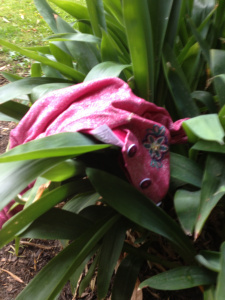 On Australia Day I went to the Moonlight Cinema in the Botanic Gardens to see The Sapphires (courtesy of the Northern Territory tourism commission). What should I spy on the way in but this spangly sign that surely faeries have passed nearby, up to no good of course?
On Australia Day I went to the Moonlight Cinema in the Botanic Gardens to see The Sapphires (courtesy of the Northern Territory tourism commission). What should I spy on the way in but this spangly sign that surely faeries have passed nearby, up to no good of course?
Bloody treacherous faeries.
Faeries, you see, get fancies. They see things they like and just take ‘em. Pretty, shiny, sparkly things. And also babies. Faeries have an unfortunate tradition of taking a shine to some chubby little darling and whisking it away to the Land of Faerie to feed it little cakes and sips of flower nectar and generally spoil it rotten.
They’re not stupid, though, faeries. Even they have noticed that vanishing infants and toddlers create an awkward kerfuffle amongst those slow-witted and reality-bound humans, and some of those humans are annoyingly attached to their offspring, as well as irritatingly persistent in trying to get them back.
So faeries leave a substitute. A little changeling, very much like the child it’s replacing, but quieter. The changeling cries less, fusses less, is more placid and obedient and docile. With this sly bit of subterfuge, the faeries hope that the humans will just be grateful that their infant is suddenly much more pliable and easy to manage and not pursue the matter.
It’s not going to work this time though. Do you see that sparkly little jacket? That pink and spangly thing with flowers in it? That belongs to a bright and lively little girl who is always chattering and giggling and, well, yes, also screaming sometimes. She’s a kid. She doesn’t know all the words yet for what she wants and needs, let alone has oratory skills to help sway her audience to her way of thinking. When she’s a teenager, she’s going to be absolute hell, in the best possible way. In the meantime she chatters and giggles and screams as occasion demands.
Right now, she is making the Faerie Queen wish heartily she never saw the kid. Right now, she is expressing her opinions rather forcefully, even with her limited vocabulary, about the taste of bleeding flower nectar and the use of cobwebs – GODDAMN COBWEBS – as a blanket.
Have these faeries never noticed what kind of spiders live in the Real Plane that is called Australia, that this little girl quite rightly views with concern? It’s hard to feel cosy and relaxed sleeping under a little blankie made of the butt-silk of venomous things. Okay so maybe the kid has a problem and if she just thought about it she’d work it through and think the cobweb blankets were neat, but on the other hand, she’s thinking, you are not my real parents, who would never make me sleep under poisonous spider butt-silk sheets and wouldn’t make me drink bloody flower water and where the absolute hell is my bunny and my ninja My Little Pony and MY MUUUUUUUUUM?
For their part, her parents are not impressed with the obvious substitute they found in the stroller. This whey-faced, doughy, dull little baby with all the personality of an undercooked bread roll. Okay, so humans are not of themselves magic, but they’re not stupid, and they are, as explained, attached to their children. So these parents are going back to the gardens with this dull little changeling and they’re going to stand under the tree where they last saw their own child and they are going demand the return of their daughter. Loudly. Repeatedly. Insistently. With many, many swear words and very little in the way of attempts to bargain with the magic folk. Screw diplomacy. Give us back our daughter you creepy little winged freaks before we find a way to burn down your fairy fucking halls.
And frankly, the Faerie Queen is going to be much too relieved to be rid of this bold, brave, uncompromising, strong-willed and vocally enhanced human child to worry overmuch about the lack of courtesy.
Lost and Found is an irregular series of posts about random items I find abandoned on the streets. Sometimes I’ll make up stories about them.
Narrelle M Harris is a Melbourne-based writer. Find out more about her books, smartphone apps, public speaking and other activities at www.narrellemharris.com.


January 27, 2013
Review: Bloody Waters by Jason Franks
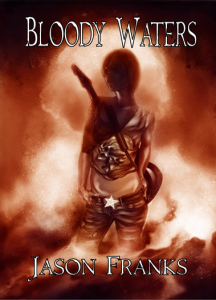 I have been telling people lately that I don’t think there are enough books in which rock and roll saves the world from monsters (which explains a recent project of my own: if there aren’t enough of ‘em, I’ll just have to write one!). At the one day Oz Horror Con, I met Jason Franks, a comics writer whose first novel had just been published. Rock and Roll? Check. Monsters? Check. Saving the world? Well, only sort of, but still, it sounded like the very thing! I promptly bought Bloody Waters for my Kindle.
I have been telling people lately that I don’t think there are enough books in which rock and roll saves the world from monsters (which explains a recent project of my own: if there aren’t enough of ‘em, I’ll just have to write one!). At the one day Oz Horror Con, I met Jason Franks, a comics writer whose first novel had just been published. Rock and Roll? Check. Monsters? Check. Saving the world? Well, only sort of, but still, it sounded like the very thing! I promptly bought Bloody Waters for my Kindle.
Franks, on his website, says that Bloody Waters isn’t like other stories about rock and roll and the Devil that you may have heard. “The stories you know are about the price of selling out. Bloody Waters is about the price of keeping your integrity. Also, pop stars, demons, sorcerers, and mafia priests. Mostly, though, it’s about music.”
And what a little corker this story is! Fast-paced, funny, exciting and a smashing good read, Bloody Waters is all about rock legend in the making, Clarice Marnier. She’s focused, uncompromising, brilliant and totally badass. She goes around making hardcore rock music and offending people left, right and centre. It’s true, with the help of her laid-back boyfriend Johnny, who is a warlock, she had to make a deal with Satan in order to get a recording contract, but the talent and the drive are all hers. And she didn’t make a deal to give up her own soul, either. She’s not stupid. Of course, deals with the devil are never quite what you think they are. Come to that, though, the devil isn’t necessarily quite what you think he is either.
The story zooms along at a cracking pace, and the whole Satan, demons, souls and monsters business is very much at the periphery at the start, slowly building in frequency and intensity as the story continues. You have to wait to the last chapter to find out the whole of what the Devil is up to, and the answer is both a little surprising and very fitting.
The characterisation is terrific, especially Clarice’s complete hard-assery. I think I’d like to meet her, except that she frightens me a little. She’s smart, capable, in charge and absolutely will not put up with any of your bullshit. She’s not incapable of kindness, but she does seem incapable of tact. I wish I’d written her!
Franks’ description of music, the eponymous band Bloody Waters, Clarice’s band mates, the other bands, the humans and demons scattered throughout the music industry and all the supporting characteres are superbly yet sparingly described. Chapters are broken up into sub-chapters, almost like a series of albums and EPs, and the layout keeps the story barrelling along, even while the key underlying story takes its time to unfold. It’s a terrific balance to have achieved.
I had seriously good fun reading this book, with its earthy language, wicked humour, unexpected turns, guts-and-glory rock and the stupendous Clarice and her slightly terrifying, uncompromising integrity. Highly recommended!
Get Bloody Waters from Amazon.com
from Amazon.com
Narrelle M Harris is a Melbourne-based writer. Find out more about her books, smartphone apps, public speaking and other activities at www.narrellemharris.com.


January 22, 2013
Review: Drink, Smoke, Pass Out by Judith Lucy (AWW Challenge 2013 #2)
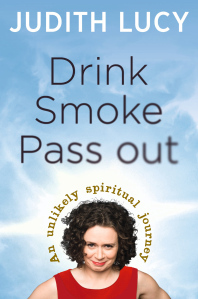 I’ve loved Judith Lucy’s stand-up comedy for years – her earthy, dry, self-deprecating wit rarely fails to hit the mark with me. Recently, in her Australian ABC documentary series, Judith Lucy’s Spiritual Journey, Lucy (a lapsed Catholic) explored her own search for spiritual meaning in a way that I (an atheist interested in philosophy) found both engaging and entertaining.
I’ve loved Judith Lucy’s stand-up comedy for years – her earthy, dry, self-deprecating wit rarely fails to hit the mark with me. Recently, in her Australian ABC documentary series, Judith Lucy’s Spiritual Journey, Lucy (a lapsed Catholic) explored her own search for spiritual meaning in a way that I (an atheist interested in philosophy) found both engaging and entertaining.
Drink, Smoke, Pass Out is a companion to the TV series, giving Lucy’s whole background from goody-two-shoes Catholic girl (so hard to imagine!) through to her adult avoidance of being troubled mainly by staying drunk and high, through to her realisation that maybe she needs to tackle her relationship with the universe rather than trying to stay numb to it. The book steps lightly through the events of the TV series (after all, you can watch that for more detail) and concludes that although she’s still looking for answers, it’s a good thing to at least be asking the questions.
The title is a riff on the popular Eat, Pray, Love, and the book is firmly planted in traditional Judith Lucy territory: sardonic, self-deprecating, earthy and mocking of pretentions, most often her own. This book could so easily have been an indulgent, self-righteous ‘I have seen the light’ affair. Alternatively, it could have been a terrible, cynical excuse to laugh at the many (and, to be fair, sometimes quite strange) ways people seek for meaning.
Instead, what you get is a thoughtful, passionate exploration of Judith Lucy’s personal demons and her practical methods of finding a better way of dealing with them than by being drunk most of the time. She’s not gone all wowser on us – she still likes a drink, she still smokes (though she seem to have given up passing out) – but she is genuine in her curiosity about people’s search for wisdom, and still approaches things with a sense of humour.
Most of the time this works well, especially given her stated aim of wanting to talk about spirituality and the search for meaning in a way that ‘doesn’t want to make people puke’. Sometimes, it’s a little jarring – a few paragraphs of thoughtful analysis and even insight often ends in a neat, sardonic little joke, and it feels like Lucy is backing off from her own opinions. Still, she is a comedian, and while she takes the notion of spirituality seriously, she remains keenly aware of human absurdity. She’s not cynical, but she has a healthy scepticism about practices and approaches that seem more about making a buck than about enlightenment.
In many ways, Drink, Smoke, Pass Out is the sceptics’ guide to the search for meaning. Grounded in reality, Lucy’s journey admits to the many ways in which people try to find harmony with the world they live in and with their own fears, lacks and disappointments. Her conclusion that the search for meaning is as important (or even more important) than claiming to have found it resonated with me. I may be an atheist, but that doesn’t mean I go through the world devoid of a moral framework or a need for meaning. Everyone needs to work out what their relationship is with the universe: with their environment, the land and their fellow creatures. My search has let me to philosophy rather than religion, but that is just one way to engage with the world.
If you are wary of treatises that wax too lyrical about angels, crystals, healing energies or other mystical gateways to happiness, but you remain interested in the human search for balance within themselves and with their world, Judith Lucy’s unsentimental but open-hearted exploration is worth reading.
Get Drink, Smoke, Pass Out on Kindle
Get Drink, Smoke, Pass Out for Kobo
Get the paperback of Drink, Smoke, Pass Out from Boomerang Books
Narrelle M Harris is a Melbourne-based writer. Find out more about her books, smartphone apps, public speaking and other activities at www.narrellemharris.com.





